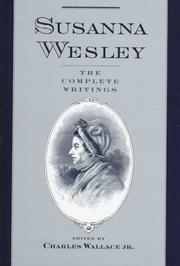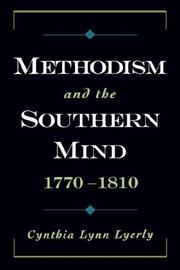| Listing 1 - 4 of 4 |
Sort by
|

ISBN: 1280441526 0195360729 058524572X 9780585245720 9781280441523 9786610441525 6610441529 0195074378 9780195074376 0199879451 0197741347 Year: 2023 Publisher: New York ; Oxford University Press,
Abstract | Keywords | Export | Availability | Bookmark
 Loading...
Loading...Choose an application
- Reference Manager
- EndNote
- RefWorks (Direct export to RefWorks)
Susanna Wesley was the mother of John, Charles and Samuel Wesley, the founding fathers of Methodism, and an outstanding female figure of the 17th and 18th centuries. Her writings are of interest to both Methodists and feminists.
Anglicans --- Wesley, Susanna, --- Wesley, Susannah, --- Annesley, Susannah, --- Methodism --- Origin.

ISBN: 1280453990 0195354249 0585182779 9780585182773 0195313062 9780195313062 0195114299 9780195114294 0197740081 Year: 2023 Publisher: New York ; Oxford University Press,
Abstract | Keywords | Export | Availability | Bookmark
 Loading...
Loading...Choose an application
- Reference Manager
- EndNote
- RefWorks (Direct export to RefWorks)
This study analyses the conflicts between Methodists - primarily white women, slaves, and the poor - and their opponents in the Revolutionary and early national American South.
Methodist Church --- Methodism. --- Arminianism --- Church polity --- Dissenters, Religious --- Episcopacy --- Evangelical Revival --- Christian sects --- History. --- Methodists
Book
ISBN: 0691244987 Year: 2023 Publisher: Princeton, New Jersey ; Oxford : Princeton University Press,
Abstract | Keywords | Export | Availability | Bookmark
 Loading...
Loading...Choose an application
- Reference Manager
- EndNote
- RefWorks (Direct export to RefWorks)
"The shocking untold story of how the FBI partnered with white evangelicals to champion a vision of America as a white Christian nationOn a Sunday morning in 1966, a group of white evangelicals dedicated a stained glass window to J. Edgar Hoover. The FBI director was not an evangelical, but his Christian admirers anointed him as their political champion, believing he would lead America back to God. The Gospel of J. Edgar Hoover reveals how Hoover and his FBI teamed up with leading white evangelicals and Catholics to bring about a white Christian America by any means necessary.Lerone Martin draws on thousands of newly declassified FBI documents and memos to describe how, under Hoover's leadership, FBI agents attended spiritual retreats and worship services, creating an FBI religious culture that fashioned G-men into soldiers and ministers of Christian America. Martin shows how prominent figures such as Billy Graham, Fulton Sheen, and countless other ministers from across the country partnered with the FBI and laundered bureau intel in their sermons while the faithful crowned Hoover the adjudicator of true evangelical faith and allegiance. These partnerships not only solidified the political norms of modern white evangelicalism, they also contributed to the political rise of white Christian nationalism, establishing religion and race as the bedrock of the modern national security state, and setting the terms for today's domestic terrorism debates.Taking readers from the pulpits and pews of small-town America to the Oval Office, and from the grassroots to denominational boardrooms, The Gospel of J. Edgar Hoover completely transforms how we understand the FBI, white evangelicalism, and our nation's entangled history of religion and politics"-- "This book examines one powerful but largely neglected ally of this rising white conservative coalition: J. Edgar Hoover and the FBI he led for almost a half-century. Revered by the evangelical faithful, Hoover was a powerful ally of and partner to the mainstream evangelical movement, working alongside Billy Graham, the mass circulation magazine Christianity Today, the National Association of Evangelicals, and other evangelical institutions and leaders to advance a Christian nationalist vision of America. In some ways it was an odd partnership. Hoover, for one thing, was not himself a "born-again" evangelical. And he maintained a domestic partnership with a male senior FBI agent that did not cohere with Christian conservative family values. Yet white Christian conservatives readily looked to Hoover and his FBI for their civic and political salvation. The Gospel of J. Edgar Hoover explains why white evangelicals from the pulpit to the pew honored Hoover as their anointed Christian champion. Part one of the book illustrates how Hoover made white Christian nationalism the bedrock of the modern national security state by shaping the FBI in his own image as soldiers advancing toward a white, Christian America. The second part explains how Hoover materially supported the white Christian nationalist project of fusing conservative Christianity with American civic life. Along the way, Martin considers broader questions about the relationship between religion and national security in American history, and what Hoover's bureau might reveal about the nature of white evangelicalism"--
Christians, White --- History --- Hoover, J. Edgar --- United States. --- United States --- Church history --- Race relations --- American Dream. --- Baptists. --- Ben Bradlee. --- Benediction of the Blessed Sacrament. --- Bible Belt. --- Bible prophecy. --- Billy Graham. --- Books of Samuel. --- Calvin (Calvin and Hobbes). --- Carl McIntire. --- Catechism. --- Catholic Church. --- Charles Hodge. --- Christ. --- Christian Order. --- Christian nationalism. --- Christian republic. --- Christian. --- Christianity Today. --- Christianity. --- Church of the Brethren. --- Church service. --- Clergy. --- Divine providence. --- Doctrine. --- Dutch Reformed Church. --- Epistle. --- Essay. --- Eugene Carson Blake. --- Evangelicalism. --- Faith of Our Fathers (hymn). --- Fulton J. Sheen. --- George McGovern. --- Grace Baptist. --- Harold Lindsell. --- Harry S. Truman. --- His Holiness. --- Ignatian spirituality. --- Image of God. --- Immanuel. --- Introduction to Christianity. --- J. Edgar Hoover Building. --- J. Edgar Hoover. --- J. Edgar. --- J. Howard Pew. --- Jehovah's Witnesses. --- Jehovah. --- Jeremiad. --- John Raines. --- John Wesley. --- Laetare Medal. --- Lay preacher. --- Lincoln Memorial. --- Lord's Prayer. --- Louis Harris. --- Lutheran Church–Missouri Synod. --- Lutheran World Federation. --- Lutheranism. --- Martin Luther King, Jr. --- Martin Luther. --- Martin Marty (bishop). --- Marxism and religion. --- Maryknoll. --- Mennonite. --- Methodism. --- Minister (Christianity). --- Monograph. --- National church. --- Old Testament. --- Parish. --- Pastor. --- Philosophy. --- Preacher. --- Precept. --- Preface (liturgy). --- Presbyterian polity. --- Prophet Jeremiah (Michelangelo). --- Protestantism. --- Publication. --- Puritans. --- Reprint. --- Roy Wilkins. --- Samuel. --- Second Vatican Council. --- Sermon. --- Society of Jesus. --- Special agent. --- Spiritual Exercises of Ignatius of Loyola. --- Stanley Levison. --- The Eleventh Commandment (novel). --- The Lutheran Hour. --- The Word of the Lord. --- Theocracy. --- Treasurer. --- United Church of Christ. --- United Lutheran Church in America. --- United States Intelligence Community. --- World revolution. --- Yale Divinity School. --- Yale University Press.
Book
ISBN: 0691215286 Year: 2023 Publisher: Princeton, New Jersey : Princeton University Press,
Abstract | Keywords | Export | Availability | Bookmark
 Loading...
Loading...Choose an application
- Reference Manager
- EndNote
- RefWorks (Direct export to RefWorks)
"When did the age of distraction begin? It might seem like a new problem, a symptom of our digital addictions, but distraction was already a source of deep concern in American culture two hundred years ago. As the industrial market economy emerged, nineteenth-century observers saw the signs: Workers were wasting time, daydreaming on the job, and the public's attention was overstimulated by new media and consumer trends. In response, social reformers designed innovative systems of moral training for the masses. Religious leaders organized far-reaching Christian revivals. And spiritual seekers like Henry David Thoreau experimented on themselves, practicing regimens of simplified living and transcendental mysticism. From the solitary confinement cells of the earliest penitentiaries to the shores of Walden Pond, disciplines of attention became the spiritual exercises of a distracted age. Through twenty-eight short passages on reform, religion, and literature from the strange and beautiful archives of this nineteenth-century attention revival, Caleb Smith reads with an eye for both language and power. Disciplines of attention, he argues, often reinforce a morally conservative social order. At the same time, exercising more careful control over our own attention promises to give us some distance from the consumer marketplace-and, today, from the algorithmic manipulations of the online attention economy. Smith writes with vigilance about the history of coercion, but also with guarded hope about practices of attention, including reading itself. From the benefits of attentive reading to the darker side of enforced attention in prisons and reformatories, this book examines distraction as a moral, political, and economic problem with a long and illuminating history"--
American literature --- History and criticism. --- Achievement (heraldry). --- Acquiescence. --- Activism. --- Aesthetics. --- Animal magnetism. --- Asceticism. --- Attention economy. --- Author. --- Backsliding. --- Bernard Bailyn. --- Bernard Stiegler. --- Big business. --- Biography. --- Byzantine Empire. --- Camp meeting. --- Capital punishment. --- Capitalism. --- Career. --- Catechism. --- Christian revival. --- Christianity. --- Church architecture. --- Classroom. --- Colored. --- Conversion narrative. --- Counterculture. --- Criticism. --- Definition of religion. --- Dissociation (psychology). --- Distraction. --- Divine judgment. --- Ethics. --- Evangelicalism. --- Hannah Arendt. --- Hannah More. --- Harvard University Press. --- Henry David Thoreau. --- Hypocrisy. --- Identity politics. --- Imperialism. --- Indulgence. --- Irritability. --- Laborer. --- Learning. --- Leaves of Grass. --- Legal fiction. --- Lethargy. --- Life Without Principle. --- Listening. --- Literary genre. --- Literature. --- Lydia Maria Child. --- Market Revolution. --- Meditations. --- Methodism. --- Modernity. --- Nat Turner. --- Nonconformist. --- Obedience (human behavior). --- Of Education. --- Oppression. --- Oxford University Press. --- Pamphlet. --- Philosopher. --- Piety. --- Poetry. --- Political culture. --- Prejudice. --- Princeton University Press. --- Prose. --- Protestantism. --- Racialism. --- Reformatory. --- Religion. --- Sanctification. --- Self-Reliance. --- Self-control. --- Self-interest. --- Simone Weil. --- Slave rebellion. --- Slavery. --- Solitude. --- Song of Myself. --- Spiritual Exercises of Ignatius of Loyola. --- Spiritual autobiography. --- Spiritual but not religious. --- Spirituality. --- Stanford University Press. --- Sunday school. --- Sympathy. --- Take Shelter. --- Temple School (Massachusetts). --- Thought. --- Thrill Me. --- Transcendentalism. --- University of Chicago Press. --- Walter Benjamin. --- Wickedness. --- Writing. --- Yale University Press.
| Listing 1 - 4 of 4 |
Sort by
|

 Search
Search Feedback
Feedback About
About Help
Help News
News